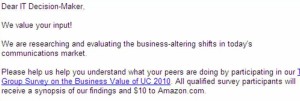 I found this email rolling around at the bottom of my Inbox the other day and it reminded me that I think sponsored research is quite a nifty thing, especially in the B2B technology space.
I found this email rolling around at the bottom of my Inbox the other day and it reminded me that I think sponsored research is quite a nifty thing, especially in the B2B technology space.
Basically, you go out and conduct a survey in your area of interest or expertise and publish the results. Bank of America has an annual CFO survey, ADP* publishes a monthly employment report, Deloitte serves up a holiday survey each fall, and Staples has been taking the temperature of small business in recent years.
If you do it right, you can publish meaningful data, position your company as a thought leader, get a little PR and create a great lead generation tool or sales piece.
Here’s how to do it right, and why the company that sent this is actually doing it wrong:
-
Hire a reputable research company
They needn’t be a household name but their survey design and methodologies should be able to withstand a decent amount of scrutiny. I’ve never heard of the company doing this study, which may or may not mean anything but should suggest they put some info in the email that helps me understand why they are to be trusted.
-
Do a credible job
The problem with this survey is that I’m neither credible nor qualified to respond to it but have an incentive to do so anyway. Several, actually. In the first place, the email is addressed to the IT Decision-Maker. IT Decision-Maker? Me? The last IT decision I made was whether or not to call them about the earring I dropped into the printer. So I probably shouldn’t participate in this survey.
This tells me the list for this email is crap. Most email lists are crap, especially the ones that promise a million addresses for $7.99. Any list that thinks I’m an IT anything is übercrap. There are two other credibility issues here. First, the $10 Amazon card is a lovely touch. Lovely enough for an idiot like me to fill in the survey with random answers and flip the email to about 30 friends. Asking people who work in a specific industry (in this case, telecom), not to respond is a great way to ensure some unscrupulous folks do just that.
-
Find new turf
Nobody wants to read a corroboration of something Gartner or IDC already cover; they want something new, specific and most of all something that adds to the overall conversation. If you sell technology to trucking companies, design your survey around specific IT issues in this market, not more general stuff like industry challenges. The study in this email is not going anywhere new. Gartner, Forrester and pretty much everyone else studies this to death and has done for years. So there’s nothing new to add to the whole discussion. Which leads me to believe, perhaps wrongly, that this isn’t really a survey at all but a massive fishing expedition for email addresses and book lovers.
-
Be prepared for boring
Sometimes nothing particularly interesting comes out of your research. Personally, I’d rather just flush it if nothing new or interesting is revealed. You may be able to spin it, however, to indicate vast amounts of despair in your sector. That could be news.
-
Make sure your data are exclusive
I recently discovered that a well-known research company I hired to investigate some verticals was reselling the data to my competitors (in a generic form). Turns out my contract lets them do this. Presumably, they’re selling my competitors’ research to me too. So it’s my fault but it still sucks. Lesson: read the contract.
-
Lather. Rinse. Repeat
The best research is the stuff you can truly own. JD Power is not the only company that measures customer satisfaction with cars, but it’s pretty hard to think of any others. Glassdoor.com isn’t the first company to create a Best Places to Work survey, but they sure own the space these days. If you can find a niche and publish an annual survey, that’s a very sweet thing. At the very least, it’s a great branding tool but if you do it right, your executive speakers can dine out on it for months, your media relations people will love you for having something good to say for a change and your sales guys will like the opportunity to start some conversations.
BizMarketer is written by Elizabeth Williams
I help companies have better conversations
Drop me a line at ewilliams@candlerchase.com
Or follow me @bizmkter
*Disclosure note: About three years after I wrote this, I joined ADP as an employee. I still think their employment report is a terrific idea.
Leave a Reply
You must be logged in to post a comment.